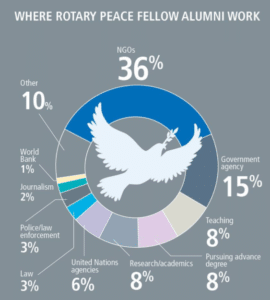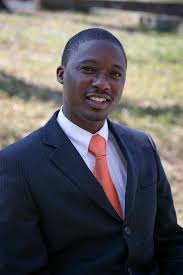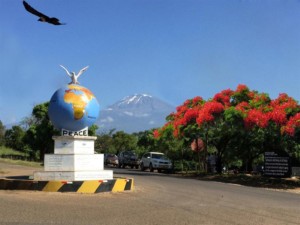Pillar of Peace: Equitable Distribution of Resources
This pillar of peace refers to income distribution but also examines whether there is equal and fair access to resources including education and health care. The UN’s inequality-adjusted Human Development Index (IHDI) is linked to the General Peace Index (GPI), but especially with the GPI’s internal peace measure. In other words, higher levels of inequality (or access to vital resources) are directly linked to higher levels of conflict, and lower levels peace within any country or region. Moreover, it is common humanity that peace is linked with the fair and equal distribution of resources, such as access to clean water, food, and basic necessities.
Rotary Peace Fellows Innovate Equity and Access
Rotary Peace Fellowships provide the brightest and best of young professionals with the education and training needed to change the world. Currently, there are over 1,000 alumni working in NGO’s, government, at the UN, and conducting cutting-edge scientific research that will help raise the standard of this IEP pillar of peace: Equitable Distribution of Resources.
Perhaps the best way Rotary International supports its IEP partner in relation to this particular pillar of peace, is through constant recruitment and training of innovators. Peace Fellows at all 6 Rotary Peace Centers around the world learn the necessity of cross-cultural experiences that lead to innovative solutions in areas of peace and conflict/prevention resolution. Applications for new Rotary Peace Fellowships are now open and must be submitted to Rotary districts by May 31, 2018.


Muyatwa Sitali
Growing up on his family’s farm in Lusaka, Zambia, Muyatwa Sitali understood the power of water in his own life. His father grew corn, cabbage, and other crops, all of which depended on rainfall and irrigation. But it wasn’t until Sitali began his Rotary Peace Fellowship that he came to realize the profound and far-reaching need for clean water globally. Read his story.

Adrien Lokangaka
Adrien Lokangaka grew up in a small village in the Democratic Republic of Congo. “As a child, I suffered from amebic dysentery, a disease that could have taken my life,” he says. “Fortunately for me, a Catholic brother gave my uncle the proper medicine, and that medicine saved my life. That’s when I decided that I should be a doctor and help sick people too.” Read his story.
Rotary Club of Moshi Exemplifies “Service Above Self”
The Rotary Club of Moshi sets a prime example of how local Rotary clubs work for peace within their communities by insuring there is an equitable distribution of resources.
Last year they dedicated a peace monument to celebrate 100 years of the Rotary Foundation. Their beautifully written dedication proclamation, by Lucy Renju, offers a blueprint for how Rotary International, along with Rotary clubs and districts, can have a profound impact upon the equitable distribution of resources in large and small communities around the world. This proclamation examines the need, offers a plan, and explains how the Rotary Club of Moshi is using the model of “service above self” to insure the abundant resources of Tanzania are distributed in a fair and equitable manner. Read the proclamation.

The Rotary Club of Moshi, Tanzania erected the Moshi Rotary Peace Monument in celebration of 100 years of the Rotary Foundation.
The Rotary Club of Moshi has served communities of Kilimanjaro since 1959. This is a list of what they (along with their partners) have accomplished, just within the last five years:
– They supported 300 orphans with education and medical treatment clothes amounting to $65,000.00.
– They supplied medical equipment to hospitals: Upare, Iwa, Kirua government clinic, Kilema Hospital, Nganjoni clinic, Msaranga clinic, Kibosho Hospital and Sanya Juu Hospital totaling to $720,000.
– They constructed a water system and filteration plant for Nyumba ya Mungu and supplied water filters to Msitu wa Tembo community and other schools around Kilimanjaro.
– They conducted Vision Aid and Albinism Awareness low vision testing amounting to $40,606 and facilitated cataract operations at Kiboshi Hospital.
– Rotarians Eliminating Malaria in Tanzania worked with the local municipality to fumigate insecticide in households, to distribute mosquito nets and diagnostic equipment, totaling to over $ 1 million dollars.
– To increase access to clean energy, they constructed biogas system for toilets at the Mashingia Government Secondary School and 12 toilets at the Moshi Primary School. In this area they spent a total of $42,366.
– Through their Vocational Skills Building and Economic Community Development project youth have acquired knowledge and skills in basic computers (87 students); technology training programs (63 teachers); and 66 students trained as part of the Second Chance Educational Programming.
– They installed rain water harvesting technology in the following Government Primary and Secondary Schools: Msaranga, Msandaka, Maringeni, Mashingia, Same, Mramba School for blind, and Second Chance Education Centre.
– Currently underway is a project called Building Lives – Vijana Poa, which aims to help youth to establish sustainable livelihoods, to provide employment, build skills and self-reliance. In this regard, they trained and provided equipment to 207 youth to start up small businesses such as hair dressing, tailoring, catering, jewelry making, pig keeping, farming, poultry keeping shop keeping etc. A total of $53,566.000 has been set aside for this initiative.
These Rotarian peace projects help insure the vast resources of Tanzania are distributed equitably within the country.
